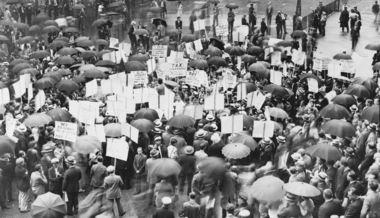You are here
Economic history
Consists of collections documenting economic activity on every settled continent including the papers of government officials and advisors, influential scholars, bankers and businessmen, and the records of for-profit and non-profit development and advocacy organizations. The collections are particularly strong in documenting the subject areas of public and international finance, economic development, United States foreign economic policies, and economic policies in Latin America.
-
Public Policy
-
Rare Books
Orlando F. Weber Collection of Economic History.
Location Designator: ExWAbout 2500 books of his library, mostly on English, French and American economics and management. The collection is separately arranged, classed and catalogued. Large number of early treatises on bookkeeping, and particularly strong on 17th and 18th century English pamphlets dealing with trade, money, banking and finance.
Presented to the Library ca. 1951, the collection was assembled by Orlando F. Weber (1879-1945). He was head of the Allied Chemical and Dye Corporation from 1920 until his retirement in 1935. He gathered his library as a basis for his studies of managerial methods, and as part of a research program which aimed to present the complexities of economic theory in simple terms to the average citizen.
A brief anecdote about Weber is found in the memoirs of the antiquarian dealer, Charles P. Everitt. See his The Adventures of a Treasure Hunter: A Rare Bookman in Search of American History (Boston, 1951) p. 81-82.
Four loose-leaf binders are available which list the entire holdings of the Weber collection and are stored with the Curatorial Documentrary Files. For particulars refer to: "The Orlando F. Weber Memorial Collection" in the Princeton University Library Chronicle XII, 4 (Summer 1951) pp. 216-217 [full text].
Pliny Fisk Collection
Founding: "Work in the subjects of money and banking, economics and finance have recently received a big impetus at Princeton University by the addition in the last few months of the famous Pliny Fisk statistical library. The library, the gift of Pliny Fisk of the class of '81, has been in the process of collection since 1880 by the banking house of Harvey Fisk & Sons of New York city, and is well known to all bankers. It is undoubtedly the most complete and exhaustive library in the realm of finance and economics in any American university. According to statistics made public by President Hibben, the collection is made up of more than 5000 bound volumes, 13,000 pamphlets, 30,000 stock and bond circulars, and newspaper clippings, which form, mounted, over 70,000 separate sheets. It is said that as a collection of corporate reports, financial pamphlets and copies of mortgages, it is unexcelled anywhere. There is a great number of reports of all the railroads in the country, and those of the more important roads are complete. Some of the statistics date back to 1828. In the collection there are also copies of leases, treaties, and agreements of railroads, some of which are extremely rare. A great part of the library is made up of the original manuscripts, the older ones written out in longhand. This library was moved to Princeton during the summer months, and Harvey Fisk, brother of Pliny Fisk, personally attended to the installation and setting up of the collection. Most of furnishings of the room are of the original library in the offices of the bankers in New York city. It is now placed in commodious quarters in the university library building and requires the continuous services of a special librarian and an assistant. It is thought that a great number of economists will be drawn to Princeton by this valuable collection, as the complicated and well worked out index system makes the library easily accessible to all. It has already proved its value to the many students in the economic and financial departments of the university, and is in daily reference use by many professors and graduate students. The development of the collection will not be stopped by its removal to Princeton, and it is expected that it will soon be one of the most serviceable libraries of its kind in the country." -- 'Fisk Library at Princeton,' Christian Science Monitor, April 18, 1916, page 19.
————————
As of 2001: "Pliny Fisk, class of 1881, ran one of the four largest investment houses at the turn of the 20th century. In 1915, he gave his collection to Princeton University Library. It was considered one of the most important historical railroad research collections. Over time, many of the books were incorporated into the main collection. However, a large portion remained uncatalogued. In 1994, the corporate materials were separated from the railroad materials. With Princeton University unable to properly archive and preserve the collection of over 150,000 railroad pieces, a new home was sought. No library was willing to take it unprocessed. Thomas Taber, a leading railroad historian, agreed to take on the collection and process and preserve it at his own expense. After spending over one thousand hours, Taber has completed the project. The collection has been divided among four libraries based on their collecting strengths -- the Railroad Museum in Strasburg, PA; the California State Railroad Museum in Sacramento; Barriger Library at the University of Missouri; and the Electric Railroader's Association. Princeton and railroad scholars owe Mr Taber a debt of gratitude for making this collection accessible to scholars."-- Bobray Bordelon ( Economics Librarian) in the March 7, 2001 issue of The Blue Sheet. Princeton University Library Staff Newsletter.
Also see the article by Herbert O. Brayer, "The Pliny Fisk Collection of Railroad and Corporation Finance" on the collection published in thePrinceton University Library Chronicle VI, 4 (June, 1945) pp. 171-178. [full text] :


